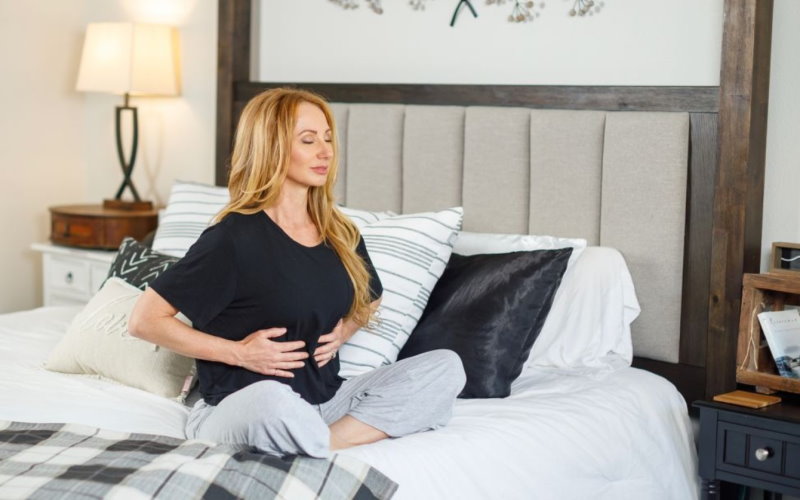You may not realize it, but your sleeping position can largely impact your health and well-being. Different sleeping positions impact the quality of sleep you get, and sleep is vital to your health. While everyone has their preferred and favorite sleeping positions, the best sleeping position in terms of maximum benefit is on your back. It aligns the spine, relieves sinus buildup, reduces tension headaches, and more. Discover the tips and tricks on how to sleep on your back.
Why sleeping position matters
There is more to sleep than you might think. If you have certain types of sleeping problems or are nursing an injury, switching up your sleeping position can make a huge difference to the quality of sleep you get. While most people prefer certain sleeping positions, many don’t have problems switching up their position in the middle of the night.
Some people, however, have trouble sleeping in certain positions. If you have problems falling asleep on your back, or you always feel uncomfortable lying on your back, then this post is for you.
First off, here are some reasons why you should learn to sleep on your back.
Benefits of sleeping flat on your back
Relieves the spine, eases back and neck pain
Sleeping flat on your back puts your whole spine and neck in a neutral position. This relieves pain by preventing compression and twisting. Since your body is straight, your weight is evenly distributed.
Help relieve hip and knee pain
Since the spine lies flat and not twisted in another direction, the hips and knees are relieved from pain, as well. The best way to do this is to place a pillow underneath your knee and calves. This is to further relieve tension from these areas.
Less muscle pressure
While sleeping flat on your back cannot particularly heal aching muscles, it can alleviate muscular tension around the shoulders, neck, and nearby muscle groups. This can help you get better sleep as relaxed muscles help relieve tension and improve insomnia problems.
Sleeping on your side puts one side of your body under certain pressure. This could cause shoulder pain, especially if you don’t have the right mattress.
Prevent headaches
Putting your neck in a bad position throughout the night can cause headaches such as “cervicogenic headaches”. People with this condition often wake up in the middle of the night due to radiating pain from their forehead to the back of the head.
Relieves buildup in the sinus
If you are struggling from congestion and sinus pain, sleeping face-up can help decongest your sinus and help relieve mucus build-up by preventing large amounts of blood from rushing through your nose and nasal cavity.
Reduces heartburn
Sleeping flat on your back with your shoulders, chest, and head slightly elevated eliminates nightly heartburn and other uncomfortable symptoms that come with it.
Prevents wrinkles
Many dermatologists suggest sleeping flat on your back to prevent wrinkle buildup. This is because sleeping on your side or flat on your stomach compresses your face. Overtime, this could contribute to sleep wrinkles.
How to sleep on your back
Our preferred sleeping position is set early in life, this is why some find it difficult to change their position or sleep in a certain position. However, there are times when you need to switch up your sleeping position. Here are some tips on how to sleep on your back with ease.
Invest in the right mattress
Start with a good mattress. A soft bed may sound relaxing; the marshmallow feel makes you feel like you are being tucked comfortably into your bed. However, a bed that is too soft will make your butt sink way lower than the rest of your body. Since your spine is in a compromised position throughout your sleep, there is a good chance you will wake up tired and sore.
The best thing you can do is to choose a supportive mattress – it should be firm enough to hold your spine throughout the night. Some mattresses even come with supportive gel pods on the lower back and waist to keep you from sinking.
Can’t buy a firm mattress? Consider getting a firm mattress topper.
Get support for your neck
A pillow that is too high puts a lot of stress on your neck due to the curvature it creates in your spine. A pillow that is too low can also hurt your spine by negatively exacerbating its natural curve. A good pillow puts your neck in a neutral and supported position. You can use a memory foam pillow or wedge pillow. You can even add a hand towel to further support your neck. Fold the towel and place it in the space between your neck and the mattress.
Pillow underneath your lower back and knees
Sleep doctors suggest putting pillows under the knees and lower back to reduce strain from the spine and support the natural curve while in a neutral position. This puts your muscles and joints in a natural position, making you feel rejuvenated when you wake up in the morning.
Do breathing techniques
Breathing techniques help to relax your body and mind and prepares you for a good night’s sleep. Here’s a quick technique called 4-7-8:
- Open your mouth gently and exhale completely by making a whoosh sound
- Press your lips back together and inhale for 4 seconds
- Hold it for 7 seconds
- Exhale slowly and fully 8 seconds, again make a whoosh sound
- Repeat the process four times and work your way up to eight as you get better
There are many breathing techniques out there that you can learn to help you fall asleep faster.
How to Sleep On Your Back: Final Words
Some sleeping positions may be more beneficial than others, but there is no one-size-fits-all sleeping position for everyone. The best sleeping position for you depends on what is comfortable for you. However, sleeping on your back can definitely provide a lot of health benefits.
Thus, you may want to train yourself to do it from time to time. It is not easy to sleep in an unfamiliar position, but like most things in life, you can learn through practice.
While sleeping on your back provides many health benefits, it is not for everyone. For people with sleep apnea, it can worsen the snoring. Also, pregnant women, especially in their third trimester, will find it difficult to lay flat on their back throughout the night.
You do not have to change your sleeping position if you are not experiencing serious issues with it. The most important thing is to wake up feeling fresh and well-rested.


























